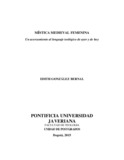Mística medieval femenina : un acercamiento al lenguaje teológico de ayer y de hoy

Fecha
2015Autor(es)
González Bernal, EdithDirector(es)
Rodríguez Osorio, HermannPublicador
Pontificia Universidad Javeriana
Facultad
Facultad de Teología
Programa
Doctorado en Teología
Título obtenido
Doctor en Teología
Tipo
Tesis/Trabajo de grado - Monografía - Doctorado
COAR
Tesis de doctoradoCompartir este registro
Citación
Documentos PDF
Resumen
Esta investigación es el resultado de un estudio sobre tres maestras místicas que en la Edad Media desarrollaron una teología que da razón, no solo de la concepción de un Dios en el contexto de la sociedad medieval, sino que revela la experiencia de un Dios mediante un lenguaje que actualiza el misterio en épocas y lugares. La investigación se propuso responder a los siguientes interrogantes ¿Qué lectura teológica hacen las maestras místicas Matilde de Magdeburgo, Margarita Porete y Hadewijch de Amberes de las categorías Dios - Padre-, Dios - Hijo, Dios - Espíritu Santo y Dios - uno y trino? ¿Cómo se caracteriza el lenguaje teológico con el que ellas transmitieron su experiencia de Dios? El estudio nos llevó a las fuentes que nutren nuestra teología hoy, por la riqueza de su sabiduría y de su pensamiento y por las características del lenguaje con el que transmitieron sus más profundas experiencias de Dios. Las maestras aportan una teología que tiene un sello personal de quien ha tenido una experiencia profunda de Dios, y una manera de interpretar dicha experiencia y comunicarla.
Abstract
This doctoral research is the result of a study about three mystic masters of the Middle Ages, who elaborated a theology not only about the concept of God in the medieval society, but also a theology that reveals the experience of God by means of a language that updates the mystery in different times and places. This research attempted to answer the following questions: what is the theological reading of the categories God-Father, God-Son, God-Holy Spirit, one and a trinity, elaborated by the mystical masters Mechtild of Magdeburg, Marguerite Porete and Hadewijch of Antwerp? What are the characteristics of the theological language that they used so as to communicate their experience of God? This research showed how these sources nourished our present theology by means of the richness of their wisdom and thought and, at the same time, for the particular characteristics of the language they used in order communicate their experiences of God. These masters offer a theology with the personal mark of those who have had a deep experience of God and a particular way to interpret it and communicate it.
Estadísticas Google Analytics

